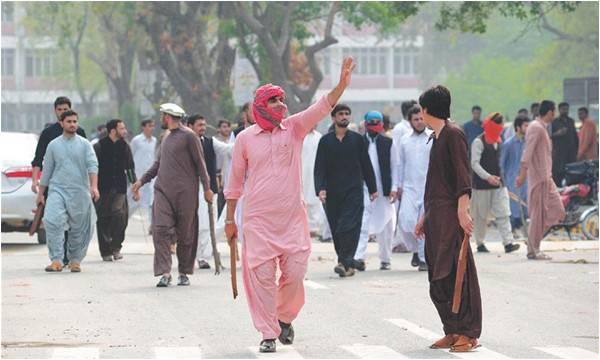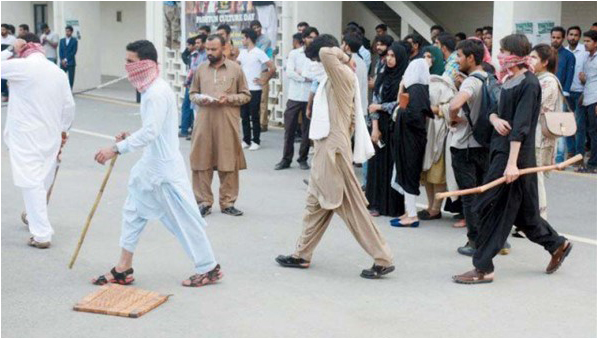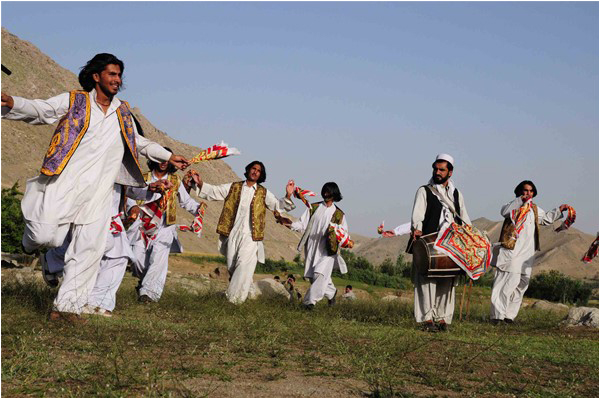
It’s a serene Monday at the Punjab University’s New Campus. In the courtyard in front of Faisal Auditorium, near the International Relations department, there is peace. Hardly any students walk by. It is hard to imagine that little over a week ago, at least five students suffered broken bones after being attacked with sticks and stones before the police intervened with tear gas. The outbreak of violence has been laid at the door of the student wing of the Jamaat-e-Islami, the Islami Jamiat-e-Tulaba (IJT) with accusations of attacking a Pashtun Culture Day event.
The Jamiat, as it is popularly known, has had a long history of being associated with campus violence, not just at Punjab University but in many other colleges in Lahore. In the nineties, firing took place almost each week. In raids, the police seized ammunition.
Members of the university administration have declined to speak. But Public Relations Officer Khurram Shehzad gave a statement: Two student organizations, the Pushtun Educational Development Movement (PEDM) and the Jamiat had planned events on the same day, at the same venue. PEDM had permission from the administration, the Jamiat did not. The university regrets the violent actions of some members of the Jamiat. The CCTV footage is with an inquiry committee formed to look into the incident, and the responsible parties will be punished.
According to the PEDM, they’ve held an annual Pushtun Culture Day for four years. They invite Baloch, Sindhis and Punjabis to take part. They want to be as inclusive as possible. It is usually a peaceful event in which Pashtun students present their traditional Attan dance and set up stalls.

But what was different this year? For one, the vice chancellor has changed. The previous VC, Mujahid Kamran, firmly dealt with unruly behaviour. He was so strict that it elicited a backlash; once his parked car was fired upon, and on another occasion IJT members chanted swear words and curses at him while he was standing with their parent organization’s own member Liaquat Baloch. The new, interim VC, Zaffar Moeen, has taken a different approach. He asked the Jamiat nazim to reconcile with the university administration through dialogue. This was the second violent incident since his appointment.
PEDM’s Shuja-ul-Hassan was in the thick of the action last Wednesday. “They had stereos with them,” he says, putting the number of IJT students at sixty. “We were playing traditional Pashto music for the Attan dance. They started playing Surah Yasin.” When the Pashtun group turned off the music, the IJT group started playing the national anthem.
The current nazim of the Jamiat is Osama Ejaz. “We wanted to hold a big 23rd March event the next day and they were occupying the space where we had to set up,” he says, giving his version of the events. “March 23 is a big day for the Jamaat. We are the custodians of Pakistani nationalism.” He alleges that the Pashtuns were chanting slogans against Punjabis.

According to Ejaz, the PEDM was formed by “anti-state elements”. “Do you know, they even play Holi on these supposed culture days,” he says. “Whose culture is that? Not ours.” He has accused the PEDM of burning the Pakistani flag and tearing down Quaid-e-Azam’s posters.
Present that day were campus dignitaries and the Punjab Higher Education Commission’s chairperson Prof. Dr Mohammad Nizamuddin, which is why there was a contingent of police, numbering about seventy.
A professor who was just crossing the courtyard heading towards her car says she saw the mob and realized that she knew some of the students. She asked them to disperse and go back to their hostels, but they had already started shouting at the Pushtun students.
The stalls were wrecked. Running Pashtun students were pelted with rocks and sticks, even the young women. The Jamiat mob chased them towards hostel 18, where, as news spread, other Pashtun students came out. “The police didn’t intervene until we started fighting back,” Hassan says. “We got most of the tear gas too.”
Part of the problem, say some students, is that outsiders come on to campus and make these conflicts worse. Sometimes, backup in the shape of students from other institutions arrives.
The inquiry committee is scheduled to give its verdict on April 2.
The Jamiat, as it is popularly known, has had a long history of being associated with campus violence, not just at Punjab University but in many other colleges in Lahore. In the nineties, firing took place almost each week. In raids, the police seized ammunition.
Members of the university administration have declined to speak. But Public Relations Officer Khurram Shehzad gave a statement: Two student organizations, the Pushtun Educational Development Movement (PEDM) and the Jamiat had planned events on the same day, at the same venue. PEDM had permission from the administration, the Jamiat did not. The university regrets the violent actions of some members of the Jamiat. The CCTV footage is with an inquiry committee formed to look into the incident, and the responsible parties will be punished.
According to the PEDM, they’ve held an annual Pushtun Culture Day for four years. They invite Baloch, Sindhis and Punjabis to take part. They want to be as inclusive as possible. It is usually a peaceful event in which Pashtun students present their traditional Attan dance and set up stalls.

But what was different this year? For one, the vice chancellor has changed. The previous VC, Mujahid Kamran, firmly dealt with unruly behaviour. He was so strict that it elicited a backlash; once his parked car was fired upon, and on another occasion IJT members chanted swear words and curses at him while he was standing with their parent organization’s own member Liaquat Baloch. The new, interim VC, Zaffar Moeen, has taken a different approach. He asked the Jamiat nazim to reconcile with the university administration through dialogue. This was the second violent incident since his appointment.
PEDM’s Shuja-ul-Hassan was in the thick of the action last Wednesday. “They had stereos with them,” he says, putting the number of IJT students at sixty. “We were playing traditional Pashto music for the Attan dance. They started playing Surah Yasin.” When the Pashtun group turned off the music, the IJT group started playing the national anthem.
The current nazim of the Jamiat is Osama Ejaz. “We wanted to hold a big 23rd March event the next day and they were occupying the space where we had to set up,” he says, giving his version of the events. “March 23 is a big day for the Jamaat. We are the custodians of Pakistani nationalism.” He alleges that the Pashtuns were chanting slogans against Punjabis.

According to Ejaz, the PEDM was formed by “anti-state elements”. “Do you know, they even play Holi on these supposed culture days,” he says. “Whose culture is that? Not ours.” He has accused the PEDM of burning the Pakistani flag and tearing down Quaid-e-Azam’s posters.
Present that day were campus dignitaries and the Punjab Higher Education Commission’s chairperson Prof. Dr Mohammad Nizamuddin, which is why there was a contingent of police, numbering about seventy.
A professor who was just crossing the courtyard heading towards her car says she saw the mob and realized that she knew some of the students. She asked them to disperse and go back to their hostels, but they had already started shouting at the Pushtun students.
The stalls were wrecked. Running Pashtun students were pelted with rocks and sticks, even the young women. The Jamiat mob chased them towards hostel 18, where, as news spread, other Pashtun students came out. “The police didn’t intervene until we started fighting back,” Hassan says. “We got most of the tear gas too.”
Part of the problem, say some students, is that outsiders come on to campus and make these conflicts worse. Sometimes, backup in the shape of students from other institutions arrives.
The inquiry committee is scheduled to give its verdict on April 2.

